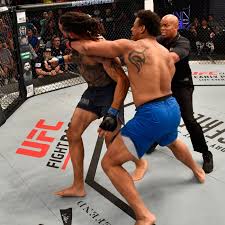
mmafighting.com
From the moment that Greg Hardy announced he would pursue mixed martial arts as a career, you knew this day was coming. That there were not enough behemoths serving as a buffer between Hardy and the top levels of heavyweight MMA to stop his rise, and that the sport’s tastemakers would not have the will or restraint to reject his athleticism and infamy.
So here we are. After yesterday’s Dana White’s Tuesday Night Contender Series season two kickoff, Hardy was selected by White for a UFC contract after a crushing 57-second knockout of fellow ex-NFL player Austen Lane.
Athletically speaking, you could hardly blame White for his decision. Around the world, there are few 6-foot-5, 260-pound fighters who can match Hardy for fast-twitch muscle, power, speed, all of the building blocks fight sports build upon. They gave him one in Lane, and despite it being Hardy’s first professional match, it proved to be no contest. A collegiate football All-American and former Carolina Panthers All-Pro, who was once listed as the No. 1 pro prospect in football, Hardy’s bona fides are beyond reproach. He flashed more of the same Tuesday with a mature right cross/reset/left hook finish, in a fashion that impressed even seasoned onlookers. There is undeniable fighting talent there.
But the conversation with Hardy has never been only about sports. The questions surrounding him go deep into his past. His high school coach Joe Hamstra was once asked if he worried Hardy might be a danger to others. According to the reporter, Hamstra let out a deep sigh and didn’t respond for a few moments before responding, “Man, you’ve got me in a tough one there.” After another lengthy pause, he continued, eventually settling on, “I felt like as long as Greg made it, he’d be OK. But if he didn’t make it? Yes, I would be concerned. What would his life look like then? That’s all I can say about that.”
As it turns out, Greg did make it, and he still couldn’t stop his life from going off the rails at times. In college at Ole Miss, he was indefinitely suspended for violating team rules. Then in May 2014, he was arrested for assault and communicating threats against a former girlfriend. He was found guilty although a court later dropped the charges on appeal after the woman failed to appear in court to testify. In September 2015, he was arrested for cocaine possession.
If past is truly prologue, we are left to wonder how and when the Hardy experiment will come crashing down this time around.
For now, Hardy has said most of the right things. That he is embracing this opportunity and that he doesn’t begrudge anyone their opinion of him, no matter how negative it might be. If you closed your eyes and listened to him speak without knowing his past, you could easily be convinced that he is worthy of this chance. But we can’t. We can’t un-know what we’ve learned about him.
It doesn’t help that he’s never taken responsibility for his actions, that he denies throwing his girlfriend against a tile shower wall, choking her, dragging her by the hair, throwing her on a bed full of guns, and slamming a toilet lid on her arm, even though a police officer found her in disarray mere moments after the incident, and even though photos of her injuries were later published.
If he would only say, “Sorry. I did something horrific and I’m going to work like hell to become a better person,” maybe he might be seen in a slightly more favorable light. Maybe that could be the start of a redemption tale. Maybe. But the fact is, he’s never been repentant, and he’s never truly been made to atone, a trend that continued with last night’s decision.
If the UFC felt some major blowback coming, it wouldn’t have made this move. In the past, White has claimed the organization has a zero-tolerance policy for domestic abuse, a declaration he got past by pointing out Hardy’s expunged record, but in reality, that was never really true anyway. It was just last summer, after all, that the promotion went into big business with Floyd Mayweather, who has been involved in multiple domestic assaults.
In that deal, the UFC knew it would take its lumps, but also that it would be compensated richly in a high-reward situation. With Hardy, it’s taking a shot in the dark, yet the brass has still decided that the juice is worth the squeeze, even for a rookie fighter. It’s a true Vegas gamble, courting disaster for the chance at riches.
All of this is a problem that should make us at least a little uncomfortable. Hardy may be entitled to the human right of making a living, but this sport didn’t have to roll out the red carpet for him to do it. He’s an undeniable talent and an undeniable problem, and those two things seem inexorably intertwined, tightly coiled until the pressure explodes into the next complication.
The fight world can agree that we hope that never happens again, but—and here’s the scary part—no one will be surprised if it does. That says a lot by itself, doesn’t it, that we legitimately have no idea whether Hardy will be a model citizen or break bad? That says everything we need to say about the state of MMA promotion then and now: make money first, last and always, and worry about everything else later.





More News
Quiñonero fights Verdadero in Resbak 2
Resbak 2 at Malungon, Sarangani Province on July 12
Garde stops Baliente in 1st round in “Resbak”